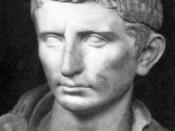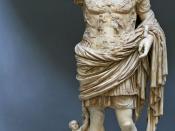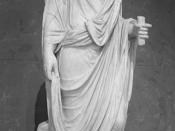Throughout his rule Augustus, born Gaius Octavius Thurinus, the Emperor of Rome, actively promoted his achievements in inscriptions, works of art and literature. This essay outlines and analyses these representations of Augustan power and the ways in which this power has been portrayed as beneficial for Rome and the Roman Empire.
Augustus was adopted by his famous uncle Julius Caesar in 44 BC, and was thenceforth known as Gaius Julius Caesar Octavianus. Subsequently, after Caesar's assassination, in 44 BC, Octavian united with Mark Antony and Marcus Aemilius Lepidus in a military autocracy branded the Second Triumvirate. The Triumvirate was ultimately torn asunder by the hostile ambitions of its members: Lepidus was forced into exile, and Antony chanced upon suicide following his defeat at the Battle of Actium by the armada of Octavian in 31 BC. Subsequently, as Thomson, notes "after the demise of the Second Triumvirate, Octavian restored the outward facade of the Roman Republic, with governmental power vested in the Roman Senate, but in practice retained his autocratic power" (Thomson 2006, 62).
It took numerous years to work out the precise framework through which an officially republican state could be led by a solitary ruler; in 27 BC, Augustus became the earliest emperor of the Roman Empire, which he ruled single-handedly till his death in AD 14.
The reign of Augustus was very successful: he "expanded the Roman Empire, secured its boundaries with client states, and made peace with Parthia through diplomacy" (Starr 1954, 55). Further, he transformed the Roman structure of levies and differing taxes, urbanized networks of roads with an authorized courier system, rebuilt the majority of the city, established a standing army and a diminutive navy, set up the Praetorian Guard, and formed official police and fire-fighting services for Rome. This last action underpinned...


